ADIPEC, held annually in Abu Dhabi, is one of the oil and gas industry’s largest events, drawing from energy ministers, CEOs, technologists and practitioners from around the globe and offering attendees the opportunity to share product innovations and new technologies.
This year’s gathering was the largest for the industry since ADIPEC’s 2019 session. In my observation, ADIPEC 2021 reverberated with an unprecedented vibrancy, optimism and enthusiasm. Industry leaders, advisors and entry-level knowledge workers enjoyed the opportunity to communicate in person and discuss, debate and resolve the current complexity of the dual challenge: achieving a sustainable future state and meeting growing energy demands.
Highlights from ADIPEC 2021
The November 15th opening ceremony, hosted by the Abu Dhabi National Oil Company (ADNOC), set the urgent, yet optimistic tone for the week. Master of Ceremonies, Mr. John Defterios (a fellow at the World Economic Form) introduced ADIPEC as the energy industry’s first opportunity to discuss key outcomes from last month’s COP26 climate change conference and map out the course the industry needs to take to thrive in a world of sustainable, low-carbon integrated energy value chains.
Following COP26, CEOs of some of the world’s leading energy companies have defended their position in the energy transition, saying their companies have been unjustly portrayed as not doing enough in regard to climate change. “It’s called an energy transition for a reason. There is no light switch. It doesn’t happen overnight,” BP’s Bernard Looney said.
Many industry leaders present at ADIPEC expressed feeling excluded from COP26 and said that many of those who had been in Glasgow had attended as individual delegates, and not as representing a company. One executive stated to me privately that as an individual delegate to COP26, he was perceived as having “snuck in.”
Taking on the “Dual Challenge”
The event’s opening video highlighted the notion of the “dual challenge”—providing sustainable energy to cap climate change at less than two degrees while keeping up with energy demand worldwide, largely driven by the fast-growing global emerging economies. Vice Chairman of IHS Markit Daniel Yergin, a highly visible and trusted presence in the energy sector, is quoted in the video saying, “It seems to me, that with population growth and with a decent growth in the world economy, world oil demand will continue its increase into the 2030s.”
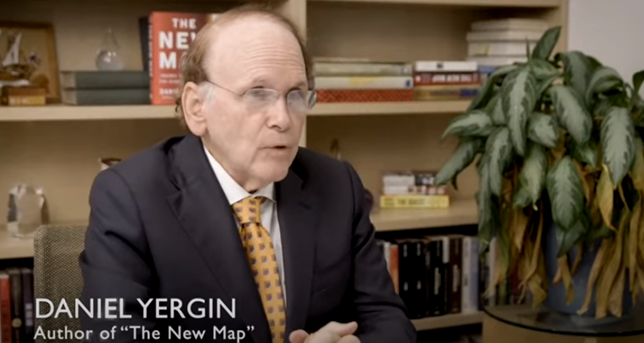
Vice chairman of HIS Markit, author and energy expert Daniel Yergin is
featured in the ADIPEC 2021 opening video and moderated several sessions.
Lord Gerry Grimstone, UK Minister of Investment said, “We have to be pragmatic, don’t we, I mean, who would want the lights to go out anywhere?”
The United Arab Emirates (UAE), currently celebrating its 50th year as a unified country, was introduced as having made an early 2050 net carbon zero commitment and will host the COP28 conference in 2023.
“It seems to me that with population growth and with a decent growth in the world economy, world oil demand will continue its increase into the 2030s.”
-Daniel Yergin, author and energy expert
Universal Agreement on the Need for a Smooth Energy Transition
While much of the discussion at ADIPEC revolved around topics like the hydrogen economy, the colors of hydrogen, carbon capture, biofuels and the like–it is important to keep in mind that for the global energy industry, the world’s demand for energy still needs to be met, and optimization of energy assets remains a key topic. For many energy providers, optimization to reduce carbon emissions remains a tactical short-term solution.
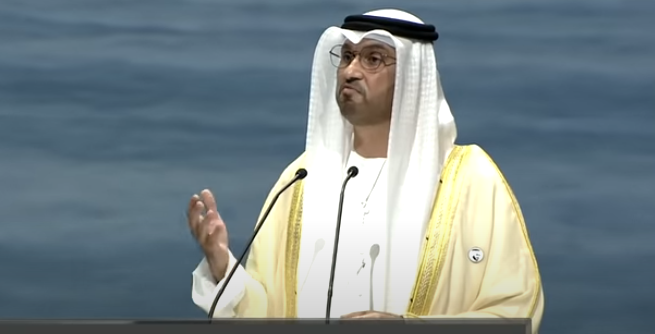
Dr. Sultan Ahmed Al Jaber, Minister of Industry and Advanced Technology, UAE
and CEO of ADNOC said, “To move to the energy system of tomorrow, from the
energy system of today, you cannot simply flip a switch.”
Progressing with Pragmatism
“COP26 had a largely positive outcome, but we now face, in the world, a basic dilemma,” said Dr. Sultan Ahmed Al Jaber, CEO of ADNOC. “The world has agreed to accelerate energy transition, but the world is still heavily dependent on oil and gas; and now the world has sleepwalked into a supply crunch.”
Al Jaber added, “Now 600 billion US dollars will need to be invested by the oil industry every year through 2030, just to keep up with the expected demand growth in the world.” He also pointed out that while the largest growth in global investment will be in renewables, “Oil and gas will be the biggest part of the world’s energy for decades to come… the world will need to progress with pragmatism.”
“We have to be pragmatic, don’t we, I mean, who would want the lights to go out anywhere?”
-Lord Gerry Grimstone, UK Minister of Investment
Investing in Low Carbon Outcomes
Another theme at ADIPEC was the signal from leading energy players that they intend to aggressively pursue winning positions in the court of public opinion on climate change. And they need to back that up with strong investments in low carbon outcomes.
Al Jaber also discussed sustainability strategies and zero carbon investments. He talked about ADNOC providing, “through virtue of geology and design,” the lowest carbon intensity hydrocarbons available and the organization’s drive to innovate around sustainability, citing its early work on carbon capture, and to increase its carbon capture capacity to 15 million tons per year by2030. He mentioned ADNOC’s four shipments of blue hydrogen to Japan and Korea and the role of AI in increasing the effectiveness of production and moving to net-zero carbon.
Al Jaber ended by talking about Abu Dhabi moving to zero-carbon electricity, through nuclear and solar power “within the next 45 days,” and that this change to renewable power would take ADNOC one third of the way on their carbon intensity journey through 2030.
He also mentioned that increasing low carbon intensity hydrocarbon production to 5 million barrels per day by 2030 (to meet the world’s energy supply shortages) and doubling their chemicals production by 2025 was also a topic of interest. In conclusion, Al Jaber reminded the audience that, “The solutions to sustainability will be found where the energy expertise exists!”
The Carbon Capture Imperative
Another common theme at ADIPEC 2021 was carbon capture. In addition to ADNOC stating they were the first in the Middle East to implement carbon capture and storage, a number of industry heavyweights spoke on an energy forum panel including the CEOs from BP, ENI, Lukoil and Occidental. The group insisted they were diversifying their energy offerings and reducing carbon emissions.
Vicki Hollub, Occidental’s CEO, discussed the company’s carbon capture program and ongoing commitment to greenhouse gas reduction. “Within fifteen years we will be a carbon management company. We will have over 100 carbon capture assets, and we will be selling carbon offsets for hard to decarbonize industries (such as the aerospace industry.)”
AspenTech CEO Antonio Pietri was a participant on ADIPEC’s carbon capture panel. He talked about the role digitalization and digital technologies are playing in making carbon capture economically viable and efficient enough to achieve the goals expressed by Hollub and the broader goals of the global community. Pietri said, “We are developing and providing technology that will optimize carbon capture in an integrated way. It is a value chain, from CO2 production, through removal, and through storage. By integrating AI and optimization technology for the above ground and subsurface parts of the system, technology will help make this a practical solution and to help scale it up.”
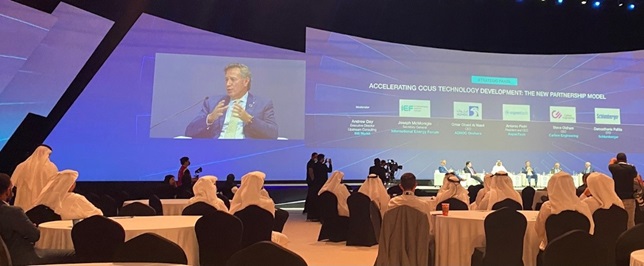
AspenTech CEO Antoni Pietri on the critical role of technology in reducing carbon emissions.
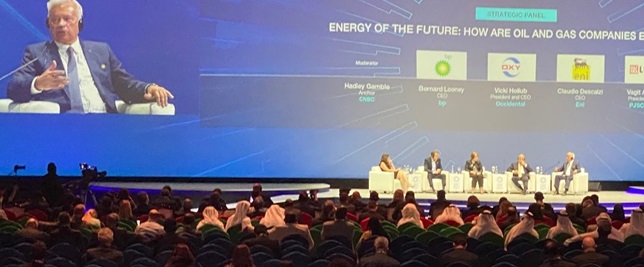
CEOs of BP, Occidental, ENI and Lukoil discussing carbon abatement at ADIPEC 2021.
During the carbon capture and utilization (CCUS) panel, Carbon Engineering’s CEO, Steve Oldham, presented the opportunity effectively and simply. “The opportunity with direct air capture is simple. Remember that 1 plus minus-1 equals zero. You can’t get carbon emissions to zero, but you can remove carbon from the air, and if you remove enough, you get the simple math 1 plus -1 equals zero. That’s what we will be doing with Occidental Petroleum.”
Final Thoughts
While ADIPEC 2021 was a successful event in terms of sharing information and ideas, it got me thinking. Often maligned energy producing companies might help their cause by joining together and showing the world how much carbon capture they are collectively doing today and planning for tomorrow. In my opinion, and the opinion of others, perhaps they need to better communicate the significant role they are playing and the collective impact they are having on global sustainability efforts.
In recognition of the great challenges and opportunities that lie ahead, it is perhaps fitting to close with a quote from Tengku Muhammad Taufik, new CEO of oil and gas company Petronas. Taufik said, “The economic pain of people today is real,” and there is a commitment to supply electricity and fuel at an affordable price. We have, he said, an implicit responsibility to supply energy today, affordable, and plan to evolve for the low carbon, sustainable future.
To see how your sustainability efforts measures up against other industry leaders, download the sustainability survey report.

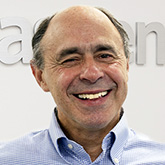
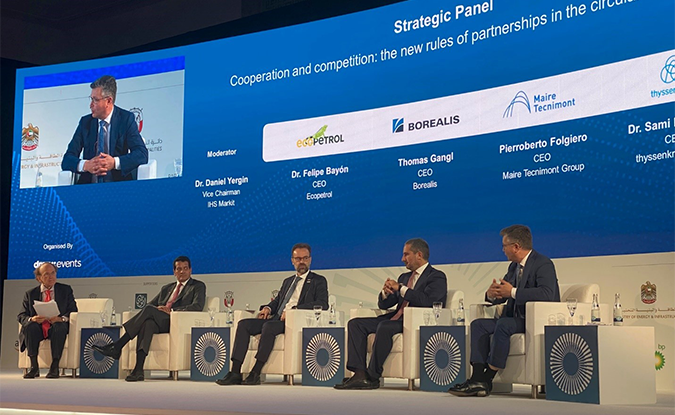
Leave A Comment